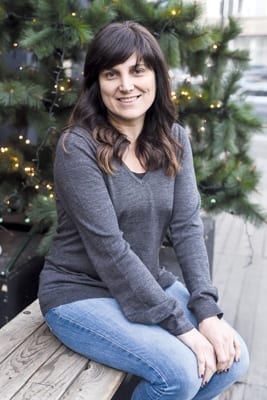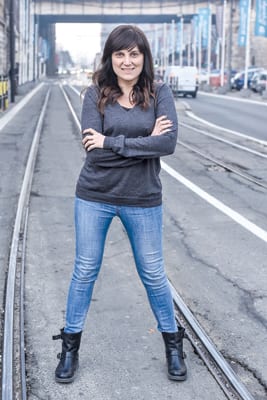There is no ordinary working day at Mikser House – rehearsal for a punk concert takes place at the same time as business meetings, and just a night after the premiere of Mikser’s own theatrical production, the space is being rearranged for some lecture or weekend festival. There are programmes here 365-days-a-year
The goal is to develop both Mikser House and Miksalište towards the model of a cultural integration centre,” says Maja Lalić. Mikser House has existed in the cultural map of Belgrade since 2013, as a unique venue for a culture that has become the epicentre of the Savamala creative district. The most prominent art centre in Belgrade, as it was recently presented by The Guardian, Mikser House is a true mixture of various activities that connect people of diverse interests.
It is dynamic to live in the Mikser rhythm, says Maja Lalić, Creative Director of Mikser House, recalling how it all began.

“Four years ago it seemed that the greatest and the only challenge was to launch an independent culture centre and make it sustainable. Stepping in a continuous cycle of daily scheduled activities and production was a very bold move, especially in our current economic and social context, but also a necessary step towards opening a physical and mental space that blurs the barriers within the polarised elite cultural ecosystem, with the goal of emancipating the audience, but also culture workers. We did that with great sacrifice and enthusiasm, never dreaming that life and work in Savamala would see us confronted by far more serious tasks, beyond the reach of cultural activities, as we then believed.”
After just a few months, Mikser House became the meeting point for Savamala residents, local artists and world experts in the field of participatory urban practices.
The goal was to highlight among the general public and city officials the necessity of including citizens in planning the future development of Savamala. Lalić adds that it was equally important to advertise the specific authentic ambience and cultural values of this city quarter.
Savamala is today recognised as a neighbourhood of creativity, active cultural life and entertainment in Belgrade, Serbia and the region, but also as one of neighbourly solidarity.
Mikser House is developing a strategy for integrating the humanitarian work that they have experienced with refugees into other spheres of culture activity
THE IMPORTANCE OF HUMANITARIAN WORK
According to our interlocutor, the summer of 2015 brought a global moral dilemma to Mikser House’s doorstep – whether to skip the mass of refugees on the way to work or to look back on the mothers and children torn from their homes and give them a helping hand.
“There was no dilemma at all. We built the Refugee Aid Miksalište in Mostarska Street, with the help of thousands of solidly united volunteers and citizens, as well as twenty local and international organisations. The turbulent history of the first centre for helping refugees from the Middle East in Savamala chronicled, in just a year and a half, the transformation of an abandoned warehouse into one of the most humane shelters for refugees in the region, its demolition within 48 hours, and the raising of a new Miksalište at 15 Gavrila Principa Street. Those experiences changed our perspectives.”
Changes are yet to come. Maja Lalić says that Mikser House is developing a strategy for integrating the humanitarian work that they have experienced with refugees into other spheres of cultural activity.
“The goal is to develop both Mikser House and Miksalište towards the model of a cultural integration centre that adapts to the needs of the local community and today provides a response to the refugee crisis, and which in the future will enable the inclusion of various vulnerable social groups in the process of exchanging knowledge and skills in the field of creative work and social entrepreneurship, using the valuable experience we have gained through the struggle to ensure the survival and sustainability of Mikser House.”
So far, Mikser House has found a sustainable model by promoting quality commercial activities that are not its primary content. The team carefully chooses which events to host. Some of them include the Balkan Cheese Festival, Mikser Kids Market, Business Café etc. Support to innovative practices represents the main objective and by leasing out this inspiring conceptual space to third parties they are conveying a certain message.
STRONG SUPPORT FROM THE INTERNATIONAL COMMUNITY
Representatives of the international community in Serbia have supported Mikser House from the very beginning. As Lalić explains:
“Despite the lack of institutional support from the relevant institutions responsible for culture in the country, Mikser has been recognised by the international community in Serbia as a strategic partner for cooperation. The projects are very different.

They range from vital support to Miksalište, through projects in cooperation with the Norwegian Embassy or the Embassy of Switzerland, to cultural exchange programmes and hosting the world’s top creators – thanks to now long-standing cooperation with the embassies of the Netherlands, Austria, Switzerland, Sweden, Germany, Italy and Belgium.
These friendships open new doors to Mikser in the international arena – through the positive personal experiences and recommendations of our previous guests, thanks to which we are gaining increasing international visibility.”
Audience development represents a necessity for any modern cultural institution. Diversity is again the keyword. The Mikser House team is trying to bring different creative fields closer to a very wide range of people, with a particular emphasis on members of the younger generation and the local community, which consists of a mix of people with very different interests and education.
“We don’t keep the “holy grail” of culture as an exclusive right of the intellectual elite. This is a certain freedom that the provincial culture scene does not forgive easily, but you need to have it if you are truly committed to changes in society and the emancipation of every member of the audience.”
The struggle for a new, better audience is a process and a major challenge, especially in the context of the model of culture predominantly represented in the Serbian media. As such, Mikser House pays great attention to building its own channels of communication and fostering a large creative community gathered around Mikser. Social media represent the main channel to do that today.
Representatives of the international community in Serbia have supported Mikser House from the very beginning
The reputation and the marked impact that Mikser House has on the local creative scene represents inspiration and a successful model for other players in independent culture, such as Dorćol Platz or different spaces in Cetinjska Street.
“I believe that is exactly the point that good ideas are transmitted, developed, connected and give birth to something new, in line with the challenges of the new era. Lately, I often hear similar comparisons with Mikser House and I see that as some kind of evidence that young people from Belgrade needed us. This hunger for creating, learning and developing is still unfulfilled.”
Maja strongly believes that a mature attitude towards the “competition” significantly determines the survival of initiatives in culture, especially if one has aspired to be a catalyst for a humane, sustainable social environment. This is certainly an incentive for further development of the Mikser platform, as Belgrade and Serbia obviously need a lot of different culture centres or spaces that will provide a “first chance” for young creatives.
The platform for young designers
Young Balkan Designers (YBD) is a regional talent platform dedicated to identifying, promoting and developing the creative potential of the Balkans in the field of conceptual and product design.
The two-year programme consists of a regional design competition, an international touring exhibition of the winning projects and a series of residency workshops and practical training courses around the region, tailored by the final three winners of the project, in cooperation with the leading regional design manufacturers.
As a result of the evolution of the project, two regional partner organisations are joining Mikser to co-organise and manage the YBD project, creating a cooperation network among equal partners: the Croatian Design Association, Public Room from Macedonia and the Mikser Organisation from Serbia.
The greatest success of the YBD platform to date has been raising public awareness of the need for cooperation between rich local talent and manufacturers. The most recent examples and concrete results of this campaign are projects of design residences during which winners of the Young Balkan Designers competition participated in the development of prototypes for companies Metalac, Prostoria, Regeneracija, Spin Valis, Dizajn DN, Urum, We and Nature.
The development of this platform for young designers and increasing awareness of the problems of the sector at the regional level led to the formation of the Balkan Design Network. This regional network aims to articulate and provide strategic support to the development of Balkan design, and to promotion within the region, Europe and at the international level.
As Maja Lalić told CorD, next year will be dedicated to deepening cooperation with regional manufacturers – through a special edition of the regional YBD competition. The point is to seek solutions to the specific needs of manufacturers and present the winning solutions at one of the largest international festivals of design in Cologne in early 2018.